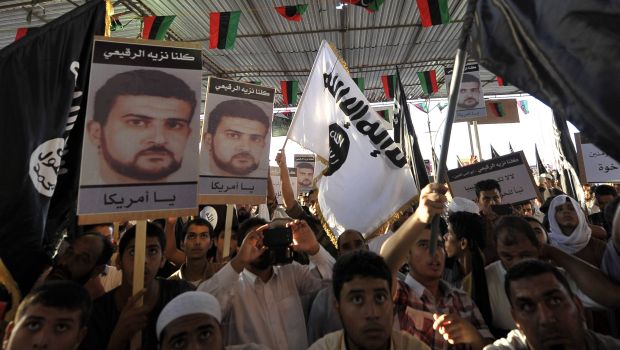
People hold posters of senior Al-Qaeda figure Abu Anas Al-Liby during a demonstration over his capture by US authorities, in Benghazi on October 11, 2013. (REUTERS/Esam Omran Al-Fetori)
Sha’ban Hadiya, leader of the group, also personally denied the group’s involvement in Zeidan’s kidnapping, which was resolved after a few hours when another militia group forced his captors to release him. Hadiya also said that he spoke to Zeidan and clarified the matter.
Hadiya added, in a brief statement posted to the group’s official Facebook page, that “Mr Zeidan has told me that they [the kidnappers] have infiltrated the [Operations Room of Libya’s Revolutionaries] because ‘the ones that kidnapped me told me [Zeidan] so’.”
Meanwhile, Minai, the activist who has filed a lawsuit against Zeidan, stated that he was prevented from holding a press conference to disclose the details of his case against Zeidan to the national media.
Zeidan has called for clarification from the Operations Room of Libya’s Revolutionaries in their role in his 7 hour kidnapping.
He has also accused political rivals of capturing him in an attempt to overthrow the government, as well as undermine it.
“This was not an attempt at kidnapping the prime minister only. It was an attempt to overthrow the government,” Zeidan said on October 11.
Congress is currently stalemated thanks to disagreements between the largest secular party in the country and the Muslim Brotherhood, with Zeidan potentially facing a vote of no-confidence.
The confusion that has swirled around Zeidan’s detention has highlighted the security vacuum that persists in Libya, two years after the overthrow of dictator Muammar Gaddafi by revolutionary militias backed by NATO air power.
Since 2011, Libya’s shaky interim government has struggled to both reign in and professionalize the militias it has been forced to rely on to fill the role of the now-defunct national army and police. It has had little success in persuading many of the different groups to recognize its authority, leading to sporadic acts of violence and political blackmail on their part.
Further complicating the situation, Zeidan’s kidnappers have reportedly revealed that they were motivated by reports that the Libyan authorities were aware ahead of time that the US was planning to capture Abu Anas Al-Liby, wanted in connection to Al-Qaeda bombings of two US embassies in East Africa in 1998.
Liby, a Libyan national, was seized by a team of US Army commandos and FBI and CIA agents from outside his home in Tripoli on October 6, and taken into American custody.
Hundreds of Islamists took to the streets of Benghazi on Friday to protest Liby’s seziure. They called for his release, and raised his picture along with Al-Qaeda’s black flag. They also chanted slogans expressing their discontent at the United States and Libyan security forces.
Elsewhere in Libya, violence has erupted in recent days in the eastern city of Benghazi, also highlighting the precarious security situation in the country.
A former employee of the Interior Security Agency revealed that Mohamed Al-Fitouri, whose father is a commander of Zintan Martyrs Battalion, was assassinated on Saturday by unknown assailants in Benghazi.
The security source said “unknown persons in a Jeep fired directly at him in the Al Laithi district and then fled.”
The home of Salah Buhaliqa, commander of the national power movement in the central region, was targeted in another attack in the city.
Libya’s Al-Tadamun News agency reported a security official stating that “Buhaliqa’s home, located behind the Hyatt Regency Hotel, was targeted by unknown assailants, resulting in material damage to the house and surrounding homes.”
Adding to events, the Libyan Popular National Movement, established by former officials from the Gaddafi era, revealed on Friday that it is part of a legal movement opposing the decision by the International Criminal Court (ICC) to permit Libya to host the trial of Abdullah Al-Senussi, Gaddafi’s right-hand man and former intelligence chief of Libya.
In a statement issued by the group, regarding its view on the decisions of the ICC and United Nations, they said that the decision “is not based on a sound legal footing. The reality is that this is beyond the current political, legal and security capabilities in Libya.”
They warned that the decision will subject Senussi to grave danger, both physically and mentally, due to the ICC’s “abandonment” of its legal duties.

Trackbacks/Pingbacks